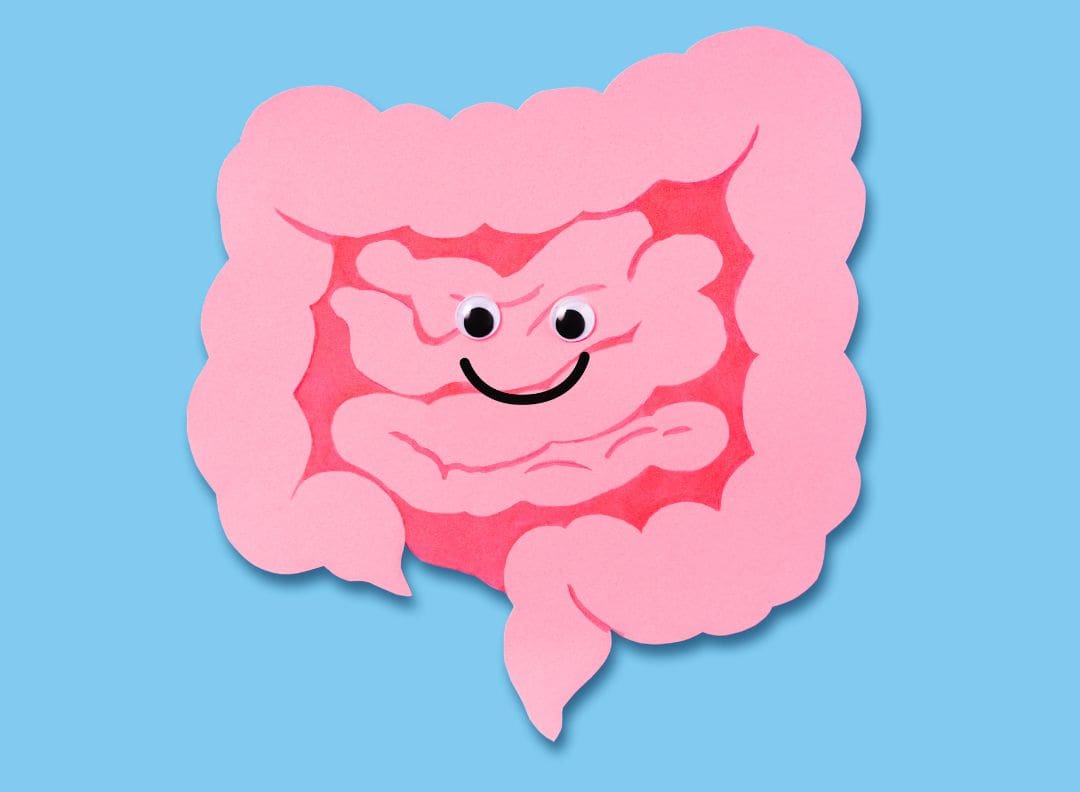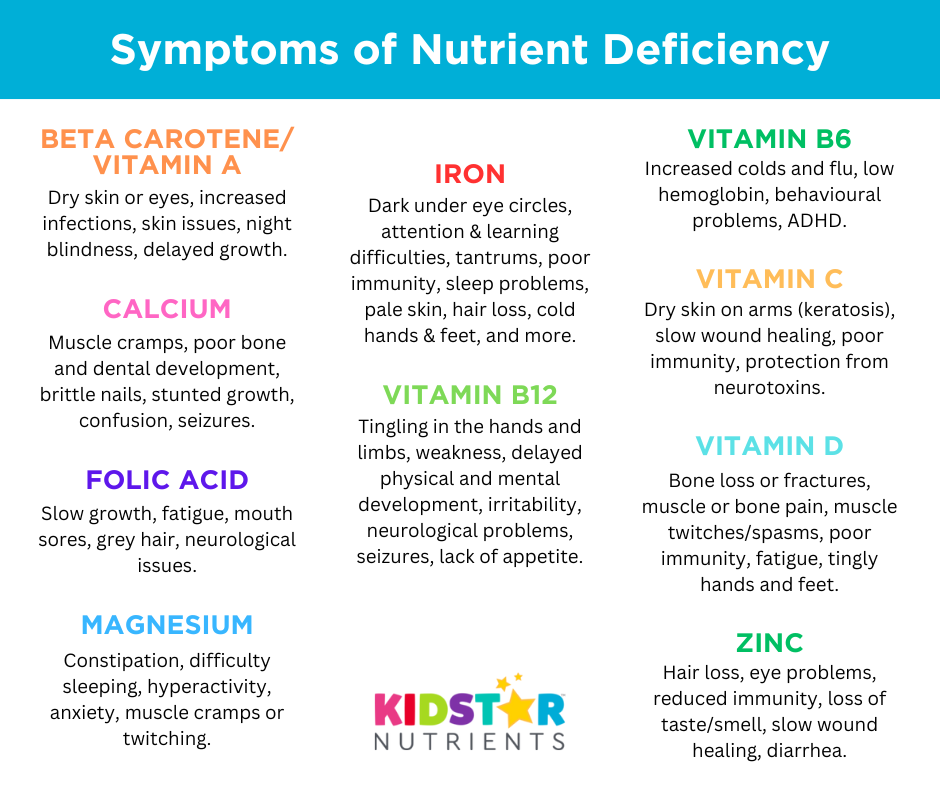Digestive Disorders and Nutrient Deficiencies: IBS, Celiac, and Crohn’s

By Rhianna Ross, RHN
A health issue that is often overlooked in adults and children with digestive disorders such as IBS, celiac disease, and inflammatory bowel disease (Crohn’s and ulcerative colitis) is nutrient deficiencies. Low nutrient levels can be caused by many factors stemming from celiac disease and other digestive disorders, including lack of nutrient intake, poor digestion, loss of appetite, and malabsorption.
Common Nutrient Deficiencies Associated with Digestive Disorders
The most common nutrient deficiencies associated with digestive disorders include calcium, iron, vitamin D, vitamin B12, vitamin B6, folate (folic acid), magnesium, zinc, and vitamin A. Symptoms of nutrient deficiencies differ depending on the specific nutrient or nutrients that are not absorbed optimally. Some nutrient deficiencies may not show symptoms until they are very advanced.

Iron Deficiency
Iron deficiency is the number one nutrient deficiency in women and children and is a common complication in people with celiac disease and IBD. Iron is essential to the growth and development of children, helps to make sex hormones in adults, and is needed for energy. Vegans, vegetarians, women who menstruate, athletes, the elderly, and children are also all at risk of deficiency.
The best form of iron to supplement with is iron pyrophosphate. Look for iron that is micronized and microencapsulated, which helps to reduce irritation to the digestive tract, and does not cause constipation, diarrhea, nausea, or cramping.
BioFe Iron from KidStar Nutrients is formulated with micronized and microencapsulated elemental iron. Microencapsulation allows BioFe iron to be taken at the same time as foods and nutrients containing calcium. BioFe is gentle and will not upset sensitive stomachs or stain teeth like common iron supplements. BioFe is available in three forms: unflavoured drops, tiny chewable tablets, and delicious liquid.
Vitamin D Deficiency
Vitamin D deficiency is common in individuals with digestive disorders. Vitamin D is the only vitamin that acts like a hormone in the body. It is primarily made via the skin through exposure to the sun. Vitamin D is essential for immune health, to prevent certain cancers, and for strong bones and muscles. It is common for there to be no symptoms of a vitamin D deficiency until a person is very low.
Vitamin D supplements come in D2 (ergocalciferol) and D3 (cholecalciferol) forms. Supplement with the D3 form, which is more easily absorbed by the body.

Vitamin D3 Spray from KidStar Nutrients is a delicious vitamin D3 spray formulated for children and adults. Our easy-to-use spray bottle delivers vitamin D3 with a delicious organic orange flavour, sweetened with monk fruit. Just two sprays delivers 1000 IU of vitamin D3.
Vitamin B12 Deficiency
Vitamin B12 is often poorly absorbed in people with untreated celiac, and those with Crohn’s. However, people with ulcerative colitis are also at an increased risk. Vitamin B12, also called cobalamin, is essential for blood formation, and brain and nerve function. Every cell in the body requires B12. Vitamin B12 deficiency is associated with elevated homocysteine, impaired brain function, and several blood disorders.
Vitamin B12 supplements are best absorbed as methylcobalamin. Food sources include fish, meat, poultry, eggs, and dairy.
StarMulti from KidStar Nutrients contains 20 essential vitamins and minerals for active growing children, including 5 mcg of vitamin B12 (as methylcobalamin) per chewable tablet.
Magnesium Deficiency
Magnesium is a cofactor in over 300 enzyme systems in the body. It is involved in muscle and nerve function, glucose control, blood pressure regulation, sleep, bones, and much more. Those with IBD or chronic diarrhea as seen in IBS-D are at a greater risk of magnesium deficiencies.
Magnesium supplements are best taken in the form of magnesium bisglycinate or magnesium threonate.
StarMulti from KidStar Nutrients contains 20 essential vitamins and minerals for active growing children, including 32.5 mg of magnesium (as bisglycinate and oxide) per chewable tablet.
Vitamin A Deficiency
Vitamin A is required for healthy immune function, skin, teeth, bones, vision, reproductive system, and cell membranes. There are two forms of vitamin A. Preformed vitamin A or retinol is found in animal products and pro-vitamin A carotenoids are found in plant-based foods. Carotenoids are what give vegetables the yellow, orange, or red colours, which when eaten are converted into vitamin A.
Causes of Nutrient Deficiencies in Digestive Disorders
Nutrient deficiencies are especially common in people with:
- Gluten intolerance
- Celiac disease
- Crohn’s disease
- Ulcerative colitis
- Leaky gut syndrome
- Too little or too much stomach acid
- Dysbiosis (not enough good gut bacteria)
Inflammation and damage to the small and/or large intestines can lead to nutrient deficiency in people with digestive issues. The damaged gut cannot absorb enough nutrients.
Inflammation can also affect transit time, the time it takes food to move through your system. When transit time is too fast, the amount of nutrients absorbed by the body is decreased. Conversely, a slow transit time (constipation) can also cause issues.

Not eating enough of the right foods can cause nutrient deficiencies. Exclusionary diets, commonly followed by people with IBS to help pinpoint trigger foods, can lead to deficiencies. Additionally, gluten-free alternative grains and gluten-free processed foods often don’t have sufficient fibre, vitamins, and minerals, leading to further deficiency.
Also, the medications and surgical treatments for Crohn’s or colitis can further reduce the digestive system’s ability to absorb nutrients.
How to Get More Nutrients and Improve Absorption
Each digestive disorder will require different dietary approaches during flare ups. Work with a health care practitioner who can help you address your specific needs.
In general, some tips can help most people increase their nutrients absorption:
- Eat smaller meals, more often, to help the body absorb more nutrients.
- Address constipation and/or diarrhea when possible.
- Avoid foods that increase inflammation and diarrhea, such as caffeine, lactose, deep fried foods, and alcohol. Those who struggle with diarrhea should consider including electrolytes.
- Add fibre to your diet. Soluble fibre can help to reduce diarrhea by absorbing water in the digestive tract. Insoluble fibre helps those with constipation.
Some digestive disorders such as IBS, celiac, and colitis may benefit from a probiotic. Prebiotics, found in foods such as oats and bananas, help to soothe inflammation.
Ensuring you get adequate nutrients may be more challenging if you have digestive issues such as celiac disease, IBS, or Crohn’s. Taking high-quality nutritional supplements designed for optimal absorption can help increase nutrient intake and absorption to help prevent nutrient deficiencies. Liquid and chewable supplements are better absorbed in those with severe IBD.
Not all nutritional supplements are created equal. Always read the label to check the dose and the form of the nutrient.
Find quality supplements here
Complete multi vitamin and mineral formula with the highest quality essential nutrients.
StarMulti®
$34.99
Easy on the stomach, delicious, tiny chewable tablet.
BioFe® Pure Iron Chewables
$18.99 – $35.99
Easy-to-use Vitamin D3 spray, flavoured with delicious organic orange.
Vitamin D3 Spray
$21.50

About the Author
Rhianna Ross, R.H.N., is a registered holistic nutritionist based in Vancouver, BC. Rhianna has more than a decade of experience in the natural health and wellness industry, and currently works at KidStar Nutrients, where she enjoys reviewing and analyzing the latest nutritional research papers, meta-analyses, and journal articles.
